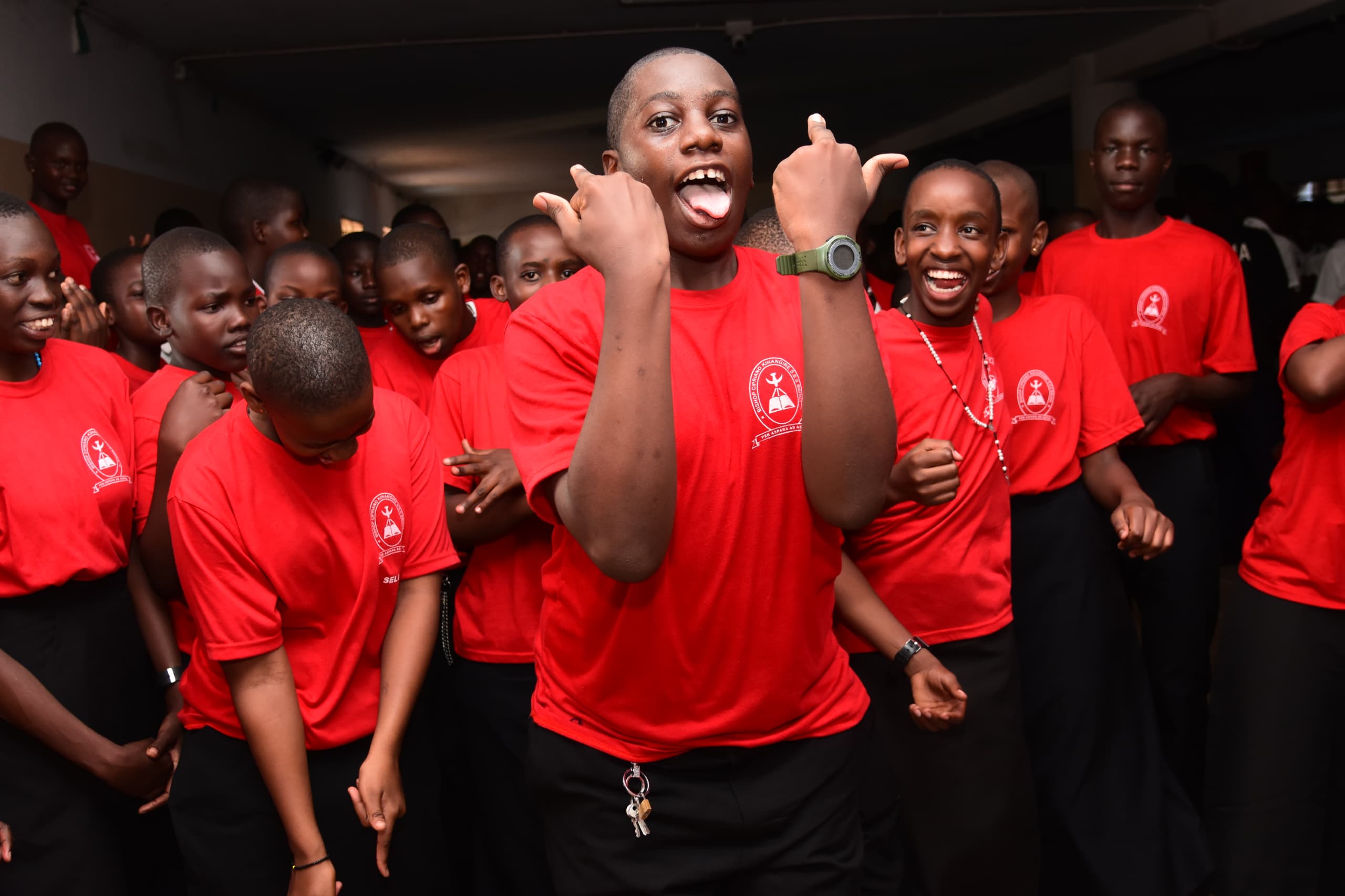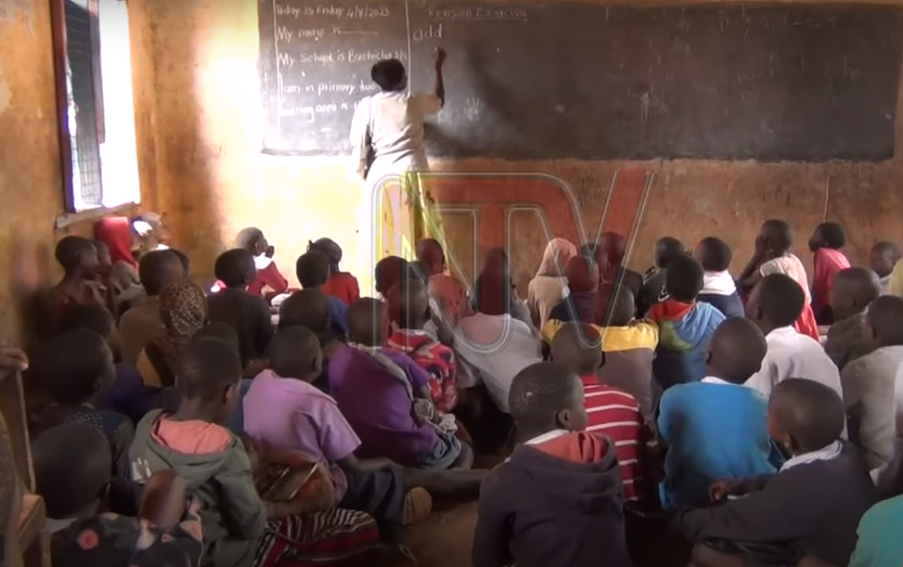
Ms Deborah Basekanakyo (right), the head teacher Wanyange Girls SS, Jinja shows parents what her students have managed to do under the new Lower Secondary Cirriculum during an exhibition at the school last year. PHOTO/ABUBAKER KIRUNDA.
In 2020, the government implemented a new Lower Secondary Curriculum, moving away from the old subject-based system to a competency-based approach.
This new approach aims at producing graduates with basic and practical skills necessary for the labour market.
This shift, Ms Bernadette Nambi, the deputy director of the National Curriculum Development Centre (NCDC), said was intended to align education with the demands of the current workforce and ensure students are better prepared for the realities of employment.
Ms Nambi yesterday told Monitor in a telephone interview that the new curriculum was revised to include skills demanded by employers, such as communication, critical thinking, problem-solving, creative, and innovation skills.
Self employment
Ms Nambi said the addition of these skills alongside practical and vocational subjects will facilitate employment for Senior Four leavers and enable them to leverage these skills in creating job opportunities for themselves.
“Our students will be equipped to solve problems, armed with employable skills they acquire before completing their Senior Four. They will utilise these generic, practical, and project skills as a foundation for securing employment or establishing their ventures for sustenance,” Ms Nambi said.
Besides the core subjects, Ms Nambi said each student is expected to undertake at least one vocational subject across Technology and Design, Performing Arts, Agriculture, Civic Education, Food Technology and Nutrition, as well as the Creative Arts.
She said the skills acquired from the vocational subjects would not only aid the leavers in their daily lives but also enhance their ability to navigate and thrive in various aspects of the workforce.
New curriculum, new hopes
Similarly, the head teacher of Kololo Secondary School, Mr Edward Kanonya, expressed optimism about the students undertaking the new Lower Secondary Curriculum. He said while they have not yet entered the job market, he believes the instilled skills will enable the students to thrive.
“Since the new curriculum emphasises the practicability of what the learners are taught, we are seeing them actualising what is taught in various subjects and coming up with solutions. With the creative skills they have attained, we are likely to see them thrive in the labour market compared to those before them. Their attitude towards work will also be much better,” Mr Kanonya said yesterday.
However, Mr Fagil Mandy, a renowned educationist, who salutes the importance of imparting employable skills to the learners through the new curriculum, said the teachers and school heads have not yet received adequate training to effectively deliver the new curriculum.
He said this lack of preparedness might frustrate the achievement of the curriculum objectives.
Mr Mandy said: “The teachers do not possess the necessary skills to handle the curriculum. The current situation is dire because even the school managers, tasked with overseeing implementation, are ill-prepared.”
“We must ensure the training reaches all schools and stakeholders since without the know-how, our efforts will be in vain,” he added.
Mr Mandy said the competency-based curriculum should not be limited to lower secondary, but should be extended across all the educational institutions, including at universities to ensure the learners acquire generic and employable skills.
The pioneer students of the new Lower Secondary Curriculum are set to sit for their end-of-cycle exams this year. However, while they’ve been studying the new curriculum in lower secondary, they’re expected to transition to the old, non-competence-based curriculum at A-Level due to the government’s failure to deliver the new A-Level curriculum, citing budget constraints.
The Principal of the College of Education and External Studies at Makerere University, Prof Anthony Mugagga, expressed optimism that all students across the country, at every level of education, can develop income-generating activities after graduation if properly supported. But he said the implementation of the new Lower Secondary Curriculum has posed challenges, necessitating reorganisation.
“If the government ensures every learner acquires at least one skill to create employment opportunities after their studies, we would be in a better position as no government worldwide can employ all its students. We must strive for self-reliance,” Prof Mugagga said.
Just like Mandy, Prof Mugagga stressed the need for curriculum changes across all levels of education, including at universities. He said this would ensure every graduate possesses at least one skill to create employment.
About Lower Secondary Curriculum
The government started developing the new Lower Secondary Curriculum in 2010 and implemented it in 2020 after 10 years of its development.
The O-Level overhaul saw the government dropping or merging 23 subjects and approving only 20 to be taught.
The method of assessing the performance of lower secondary students was also revised, with Uganda Certificate of Education (UCE) exams results now accounting for 80 percent.
The continuous competence assessment based on skills attained in subjects taught from Senior One to Senior Four is to account for 20 percent of the O-Level final score.
Under the new curriculum, a learner is required to study 12 subjects at Senior One and Two, with 11 of the subjects being compulsory.
But Senior Three and Senior Four students are required to end with a minimum of eight or a maximum of nine subjects, but with seven of them compulsory.
How can we create more jobs for the youth?
Phiona Bizzu, Int Business graduate, MUBS.
I appeal to government and all concerned persons to look into the plight of girls who participate in beauty pageants. Many are stuck because they are financially illiterate. They do not have fallback positions
Phiona Bizzu, Int Business graduate, MUBS.
I appeal to government and all concerned persons to look into the plight of girls who participate in beauty pageants. Many are stuck because they are financially illiterate. They do not have fallback positions
Marion Nakato, Procurement and Supply Chain Mgmt.
I graduated in 2021. I have a small business, making snacks and crisps at home and selling them in town. I also sell them in buses and Kikuubo, downtown Kampala. In a week, I can make a profit of between Shs150,000 and Shs200,000.
Electine Oyaga Illungole, PR Lead, TIV.
Government needs to come up with initiatives that create pathways for job creation. We need policies and frameworks that attract potential investors to Uganda, and a conducive environment to sprout innovation and entrepreneurship.
Promise Ahereza, Sales woman.
Government should change the education curriculum and make it more practical rather than theoretical so that students start doing small businesses. Youths should also learn to socialise at events where other youths are such as conferences to network.
Latifah Namiro, SWASA graduate.
Youths should create jobs which require little capital such as bakery. I own a nail clinic.




